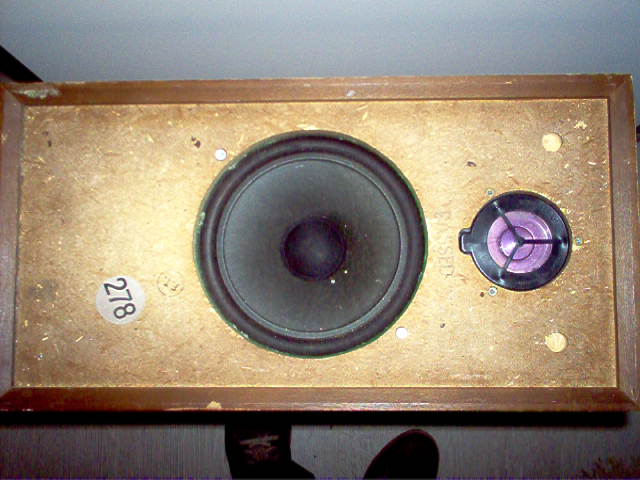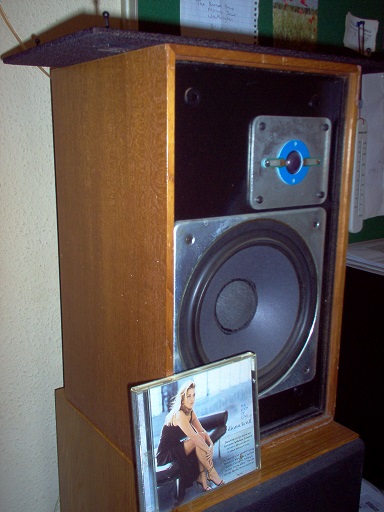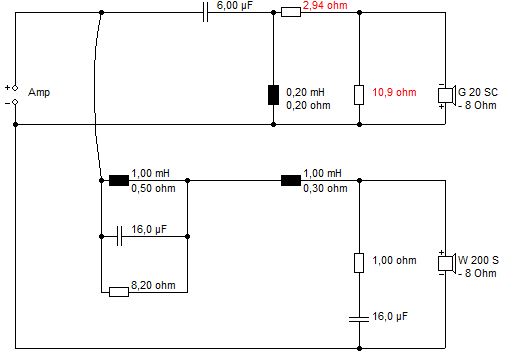Hi All. I'm new here. On lockdown and working through various projects which include attending to a pair of battered Glendales I've had for years. The problem is the paper cone tweeters are u/s. Does anyone know of any cheap direct replacements or upgrades with similar sensitivity? I've previously tried some very cheap dome tweeters and they were awful.
I often buy old Wharfedales, because I like the cabinets.
But I've never had much luck with those old plastic cone tweeters. Usually blown.
Some info here on crossovery with the similar 8" bass Linton 3XP:
Wharfedale Linton 3XP Recap
The first thing is always to measure the tweeter cutout size on the box.
Then see what fits:
Buy Monacor Treble Units Online, UK
My Super Lintons might take a pair of these Morel CAT378 with a bit of resistor work:

Morel Classic CAT378
Ought to sound a bit like the old cone tweeters. Otherwise a fullranger in a little 0.8L enclosure might do the right things:
CHN-50 full range driver | KJF Audio
I have heard these things work well with a 19mm dome plastic tweeter too. But it's not an easy fix, IMO. Needs some adjustment for level, for sure.
But I've never had much luck with those old plastic cone tweeters. Usually blown.
Some info here on crossovery with the similar 8" bass Linton 3XP:
Wharfedale Linton 3XP Recap
The first thing is always to measure the tweeter cutout size on the box.
Then see what fits:
Buy Monacor Treble Units Online, UK
My Super Lintons might take a pair of these Morel CAT378 with a bit of resistor work:
Morel Classic CAT378
Ought to sound a bit like the old cone tweeters. Otherwise a fullranger in a little 0.8L enclosure might do the right things:
CHN-50 full range driver | KJF Audio
I have heard these things work well with a 19mm dome plastic tweeter too. But it's not an easy fix, IMO. Needs some adjustment for level, for sure.
This Monacor paper cone tweeter is popular: MONACOR: HT-22/8
It has a high sensitivity of 91dB/W/m so you would require to attenuate the tweeter to match the lower 86dB/W/m sensitivity of the Glendale 3XP. We can give you guidance on how to do that.
Like Steve says, check the tweeter's dimensions first to make sure you can locate it in the present cutout.
It has a high sensitivity of 91dB/W/m so you would require to attenuate the tweeter to match the lower 86dB/W/m sensitivity of the Glendale 3XP. We can give you guidance on how to do that.
Like Steve says, check the tweeter's dimensions first to make sure you can locate it in the present cutout.
Attachments
I have done a lot of work with that little 92mm Monacor HT-22/8.
But I had a very good time with the Wharfedale Shelton XP2 with a 19mm plastic tweeter:
Vifa D19TD-05-08 Diameter 94mm

IMO, a brilliant crossover:

Far better than you have any right to expect at this price point.
But I had a very good time with the Wharfedale Shelton XP2 with a 19mm plastic tweeter:
Vifa D19TD-05-08 Diameter 94mm
IMO, a brilliant crossover:
Far better than you have any right to expect at this price point.
Thanks Steve. I shall take some measurements, and have a look see. It does look as those some replacements are available, and I don't mind altering the cabinet because they look rough at best!
That tweeter looks suspiciously like the previous dome examples I had bought for these. I found it quite shrill which may have more to do with the crossover points, given their sensitivity was similar to the old cone tweeter.
Hi Galu. That Monacor will fit, so I'm inclined to give it a go. What sort of attenuation will I need to apply?
Can I ask you first about the crossovers? Do they still contain the original, black ELCAP capacitors? If so, they should be replaced with modern NP electrolytics as the originals do not age well.
Mundorf Electrolytic ECap Capacitors
I believe the tweeter capacitor is a film type (4uF) so does not need to be replaced.
See attachment for attenuation circuit (L pad). For 5dB of attenuation use R1 = 3.3 ohm and R2 = 10 ohm (both 10W ceramic). Note this is assuming an 8 ohm replacement tweeter.
Ceramic Resistors
Mundorf Electrolytic ECap Capacitors
I believe the tweeter capacitor is a film type (4uF) so does not need to be replaced.
See attachment for attenuation circuit (L pad). For 5dB of attenuation use R1 = 3.3 ohm and R2 = 10 ohm (both 10W ceramic). Note this is assuming an 8 ohm replacement tweeter.
Ceramic Resistors
Attachments
On second thoughts, the tweeter capacitor may also be an ELCAP. If this is the case, it may explain the shrill sound you described.
Worth replacing the capacitors before buying new tweeters!
Compare your crossover board with the attached image which shows only ELCAPS.
Worth replacing the capacitors before buying new tweeters!
Compare your crossover board with the attached image which shows only ELCAPS.
Attachments
Regarding replacement capacitor values:
4, 16 & 25uF may be replaced by 4.7, 15 & 22uF which will almost certainly be closer to spec than the aged ELCAPS and within the component tolerances usually applied to these vintage speakers.
Mundorf Electrolytic ECap Capacitors
4, 16 & 25uF may be replaced by 4.7, 15 & 22uF which will almost certainly be closer to spec than the aged ELCAPS and within the component tolerances usually applied to these vintage speakers.
Mundorf Electrolytic ECap Capacitors
The crossovers still have the original capacitors. It didn't look like anyone had been in there since 1974. The Monacor tweeters are 8 ohm, so thanks for your diagram.
On second thoughts, the tweeter capacitor may also be an ELCAP. If this is the case, it may explain the shrill sound you described.
Worth replacing the capacitors before buying new tweeters!
Compare your crossover board with the attached image which shows only ELCAPS.
This is my crossover and I assume the other is the same. I prefer to mess with one and leave the other alone in case of mistakes! The capacitors look very similar to the ones in your photo.
An externally hosted image should be here but it was not working when we last tested it.
Hi,
What were the results after replacing the tweeters with the Monacor HT288's and NP electrolytic capacitors? I'm looking to do the same as the exact same thing has happened to one of my Glendale 3xp's original tweeters.
Thanks in advance!
What were the results after replacing the tweeters with the Monacor HT288's and NP electrolytic capacitors? I'm looking to do the same as the exact same thing has happened to one of my Glendale 3xp's original tweeters.
Thanks in advance!
Andrew hasn't looked in in ages!
It's going to work if it fits! Monacor HT-22/8:
Monacor :: Monacor HT-22/8 PS6.46
90mm diameter, 80mm screw holes, 63mm cut out.
I'd order a couple of 3.3R 5W ceramic resistors too, to adjust level if necessary.
But measure it first! No reason you couldn't fit dome tweeters as it goes. But a different sound.
Buy Monacor Treble Units Online, UK
It's going to work if it fits! Monacor HT-22/8:
Monacor :: Monacor HT-22/8 PS6.46
90mm diameter, 80mm screw holes, 63mm cut out.
I'd order a couple of 3.3R 5W ceramic resistors too, to adjust level if necessary.
But measure it first! No reason you couldn't fit dome tweeters as it goes. But a different sound.
Buy Monacor Treble Units Online, UK
Last edited:
I also have the Glendales and can confirm success after following this thread due to one of my original tweeters being blown. The new tweeters were not an exact fit so spacers were made from sheet aluminium. The suggested attenuation of 5 dB with the two extra resistors is perfect in my opinion. Highs are detailed but not in your face, retaining the original sound character. I'm really enjoying them, thanks everyone! 👌😁
Attachments
Good cosmetic work in fitting the tweeter Gareth!
Thanks for confirming that the Monacor tweeter hits the spot along with the 5dB worth of attenuation that I suggested!
Thanks for confirming that the Monacor tweeter hits the spot along with the 5dB worth of attenuation that I suggested!
Hi all, I'm a newcomer and I know I'm reviving an old thread but here goes...
I've just bought a set of Glendale 3XPs, on one of which the tweeter is pretty weak. If I turn treble up a lot I can get some sound out of it, which leads me to think it's not blown, and my issue may be with the old ELCAPs on the crossover? Please correct me if I'm wrong.
Anyway it sounds like other people have had good experiences replacing the old capacitors and I'm keen to do the same.
My question mainly is:
From a bit of reading I've heard that general wisdom is that foil capacitors sound better than electrolytic. I notice it's Mundorf electrolytic recommended in this thread. Why is that? cost/benefit, or is there more to it than that?
I can get the set of Jantsen cross caps (Foil) for £35, or the Mundorf electrolytic for £24. Not much in it, will the foils sound/last better?
Thanks all
I've just bought a set of Glendale 3XPs, on one of which the tweeter is pretty weak. If I turn treble up a lot I can get some sound out of it, which leads me to think it's not blown, and my issue may be with the old ELCAPs on the crossover? Please correct me if I'm wrong.
Anyway it sounds like other people have had good experiences replacing the old capacitors and I'm keen to do the same.
My question mainly is:
From a bit of reading I've heard that general wisdom is that foil capacitors sound better than electrolytic. I notice it's Mundorf electrolytic recommended in this thread. Why is that? cost/benefit, or is there more to it than that?
I can get the set of Jantsen cross caps (Foil) for £35, or the Mundorf electrolytic for £24. Not much in it, will the foils sound/last better?
Thanks all
Hi and welcome to the forum!
The ELCAPS will definitely need to go and, to return as far as possible to the original sound, I recommend replacing them with modern NP electrolytic capacitors. Mundorfs are of good quality and readily available from Wilmslow Audio - if you are based in the UK. It's doubtful that more expensive capacitors will bring noticeable audible benefits to the Glendale 3XP - it is what it is. And the capacitors will last for tens of years!
Check out the dimensions of any replacements before you buy, if you want to them to fit comfortably on the crossover board.
You should check out the 'faulty' tweeter by swapping it with the good one. If the fault follows the 'faulty' tweeter then it is, indeed, faulty. If not it is likely to be the tweeter capacitor or simply loose/oxidised spade connectors on crossover board or tweeter.
Any other questions, please feel free to ask. And please keep us posted!
The ELCAPS will definitely need to go and, to return as far as possible to the original sound, I recommend replacing them with modern NP electrolytic capacitors. Mundorfs are of good quality and readily available from Wilmslow Audio - if you are based in the UK. It's doubtful that more expensive capacitors will bring noticeable audible benefits to the Glendale 3XP - it is what it is. And the capacitors will last for tens of years!
Check out the dimensions of any replacements before you buy, if you want to them to fit comfortably on the crossover board.
You should check out the 'faulty' tweeter by swapping it with the good one. If the fault follows the 'faulty' tweeter then it is, indeed, faulty. If not it is likely to be the tweeter capacitor or simply loose/oxidised spade connectors on crossover board or tweeter.
Any other questions, please feel free to ask. And please keep us posted!
Hi, thanks very much! Yes I thought I would swap the tweeter over and see, but probably worth doing the ELCAPS first anyway, in the hope that resolves the problem. I am indeed in the UK, and have already had a look on the Wilmslow audio link you shared earlier in this thread - thank you again!
If you wouldn't mind, could you just run through what the supposed audio benefits/differences are with the foil capacitors vs electrolytic? I'm new to this and looking to get an idea what each would/should sound like. I'm not necessarily concerned about staying true to original sound; just want to achieve the best sound I can from these speakers - affordably!
Thanks again
If you wouldn't mind, could you just run through what the supposed audio benefits/differences are with the foil capacitors vs electrolytic? I'm new to this and looking to get an idea what each would/should sound like. I'm not necessarily concerned about staying true to original sound; just want to achieve the best sound I can from these speakers - affordably!
Thanks again
- Home
- Loudspeakers
- Multi-Way
- Wharfedale Glendale 3XP Tweeters




